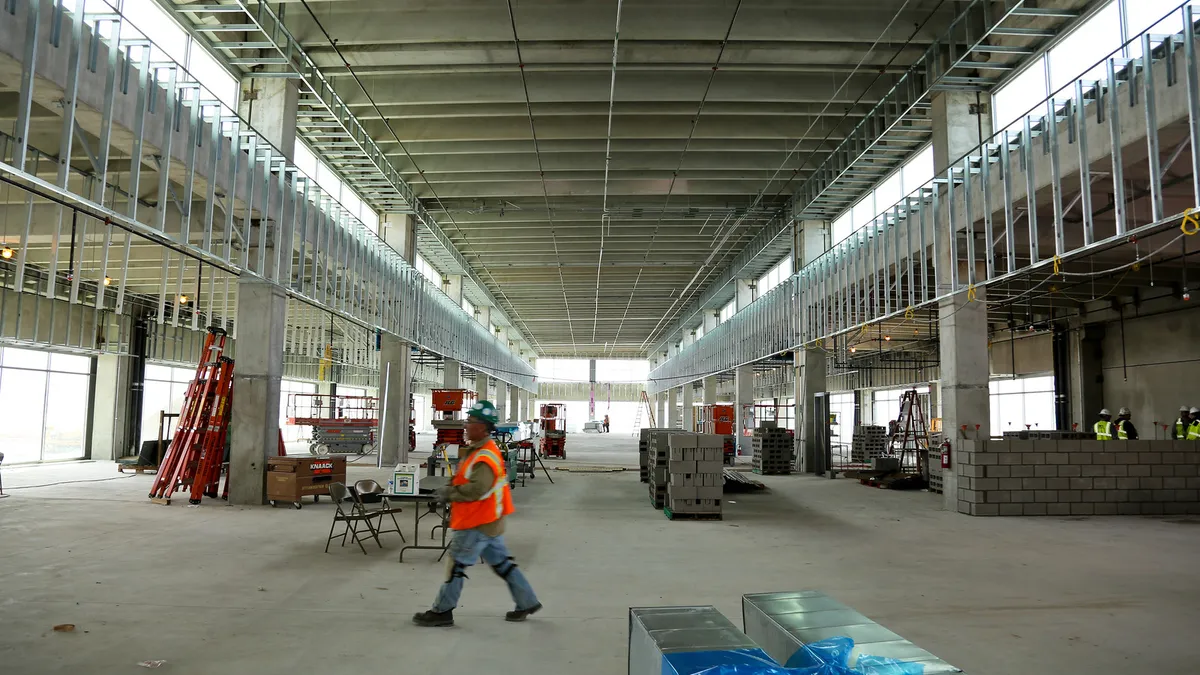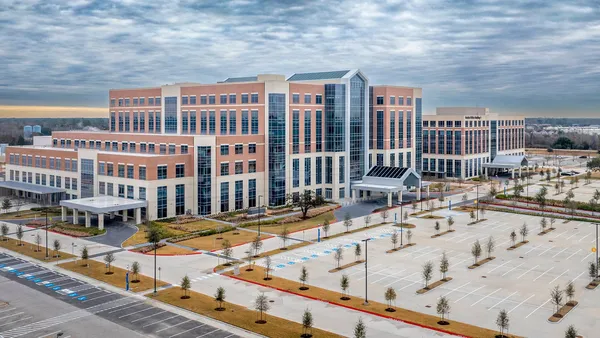UPDATE: Feb. 20, 2020: The Denver City Council has approved the $195 million construction management and general contracting (CM/GC) services contract with Hensel Phelps that the council's Business, Arts, Workforce, & Aviation Services Committee approved earlier this month. Hensel Phelps, according to an email update from the airport, will start construction on the $650 million Great Hall terminal project next month.
Hensel Phelps has a Minority- and Women-Owned Business Enterprises (M/WBE) participation goal of 18% and has already held one outreach event for the local subcontracting community. The value of M/WBE opportunities on the Great Hall project total $35.1 million.
UPDATE: Feb. 7, 2019: The Denver City Council's Business, Arts, Workforce, & Aviation Services Committee voted unanimously on Wednesday to approve a $195 million construction management and general contracting (CM/GC) services contract with Hensel Phelps for the $650 million Great Hall terminal project at Denver International Airport (DEN). Hensel Phelps will take up the work halted since Great Hall Partners contract was terminated last year. The duration of the contract is 22 months and will end on Dec. 31, 2021. The contract must still be approved by the full city council.
Shellee Casiello, communications manager at DEN, told Construction Dive that if the full city council approves the contract on Feb. 18, construction will begin in March.
DEN also updated the committee on the Great Hall project's status. The airport said it expects to release a new project schedule and scope of work this summer and should close out the termination payment to Great Hall Partners by the end of March. DEN officials still expect the first phase of the renovation to be "operationally ready" in 2021.
UPDATE: Oct. 18, 2019: Denver International Airport (DEN) on Thursday announced that it selected Hensel Phelps as the preferred construction manager and general contractor for Phase 1 of the project previously managed by Great Hall Partners. It has picked Stantec as the preferred lead design firm for the entire project moving forward. Phase I work includes airline ticketing pods in the center of the Terminal on Level 6, new restrooms and conveyances. The cost of Phase 1 is undetermined until Q1 2020, DEN said, but the agency noted that it is "committed to keeping the design and construction cost of the Great Hall Project at the original $770 million, including contingency."
Denver City Council will need to approve the selections before the airport can restart construction with its new partners, anticipated to begin in Q1 2020. The approval process will begin on Nov. 6, with hopes that it will be complete by the end of the year.
DEN said it made its selections by identifying firms that had existing contracts or were already mobilized at the site, had availability of funds and resources and who were able to bring creative solutions to their proposals.
Gilmore Construction and Sky Blue Builders will also provide construction services under existing contracts during the transition as DEN takes over the project, the DEN press release concluded.
Dive Brief:
-
It's taking longer than planned for Denver International Airport (DEN) and Great Hall Partners to settle the terms for ending their $1.8 billion terminal renovation, operations and maintenance public-private partnership (P3), according to The Denver Post. Great Hall's exit date is scheduled for Nov. 12.
-
The sticking points in the negotiations reportedly are around the dollar amount of Great Hall's termination fees and how much the airport owes its estranged partner for outstanding invoices. An August report from Moody's Investors Services estimated that the termination fee will land somewhere between $140 million and $180 million and that the airport will also have to pay an additional $70 million to cover Great Hall's loans on the project.
-
DEN is already looking to its post-Great Hall future and has retained Jacobs Engineering Group as a consultant on how to manage the project going forward. Officials are still in the process of choosing a new lead contractor and will limit the pool of bidders to those companies that are currently doing business with the airport or that have recently completed projects. DEN is also trying to make deals to retain about 13 of Great Hall's design, engineering and trade subcontractors, which could reduce the total termination fee the airport will have to pay Great Hall.
Dive Insight:
The airport is in a strong financial position, according to the Moody's report, and has plenty of liquidity — about $900 million — to back up any settlement with Great Hall.
In the days after its termination, Great Hall issued a statement that said costs would have pushed the total for the renovation portion past $1 billion, and that the airport was looking at a three-year delay to its original completion schedule.
The relationship between the two became rocky — at least, in terms of public perception — around the same time that details emerged about weaker-than-expected concrete within the existing terminal. Great Hall said it was especially concerned as to whether it would be able to support planned steel construction and associated structures, although an independent consultant hired by the airport said the concrete did not appear to pose safety issues. Great Hall also claimed that the airport had issued "more than 20 large-in-scale, badly-timed and unnecessary change directives" that had also contributed to overruns and delays.
In a September presentation to the Denver City Council subcommittee that oversees airport business, Kim Day, DEN's CEO, said that the new budget for the terminal is $770 million, which includes $120 million from the project's contingency fund, but that the new figure did not include Great Hall's termination fees. The new renovation budget is almost $250 million short of the $1 billion Great Hall said it would cost to complete the project. Day has not given a specific timetable for when DEN believes the renovation project will be finished but said at the time of the P3 group's termination that there would be some delays and some possible redesigns to reduce costs and improve the passenger experience.
So, should the prospect of Great Hall's exit negotiations taking more than 90 days have been anticipated by airport officials and was it a realistic timeline anyway?
"I think people underestimate how long it takes to start something, complete something and, in this case, unravel something," said Frank Banda, managing partner of financial consultancy firm CohnReznick LLP's public sector practice. And it can get more complex in the case of a P3 when the public agency terminates for convenience and not default. The P3 partner will have incurred costs, so agreeing to what they're owed is a big part of ending the relationship.
Another misconception sometimes on the part of the public entity that takes on a P3 is just how much risk is still involved. "What the public sector doesn't necessarily understand is that with a P3 there is a transfer of risk, but there's not an elimination of risk," Banda said. "It's supposed to be a partnership." That means that if an issue arises during construction, like the concrete problems at DEN, there has to be a mindset that the parties will work together to address it.
On the flip side, he said, there are agencies that aren't willing to hand over control to its P3 partner, despite these arrangements supposedly being an opportunity to introduce private sector innovation and know-how into the project.
As for DEN, Banda said, it will be interesting to watch events unfold. "When these things happen, all of a sudden, you have a lot of eyes on you."













